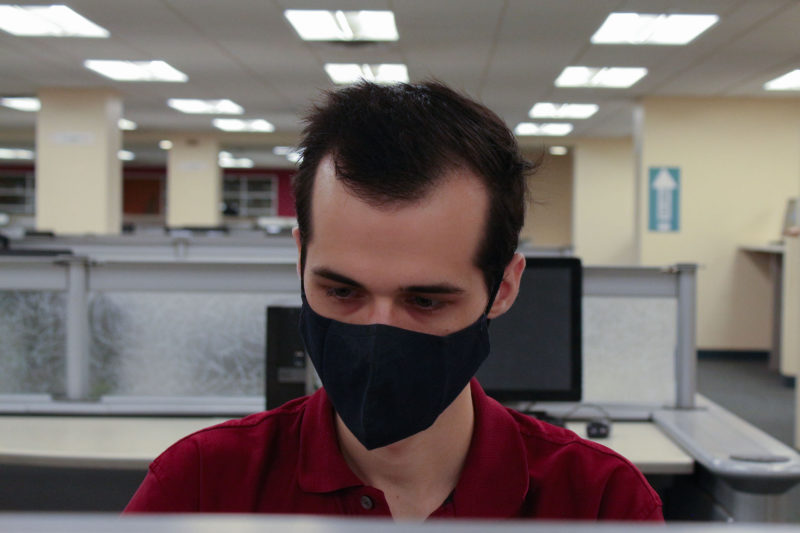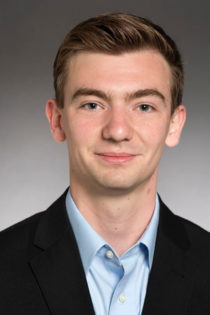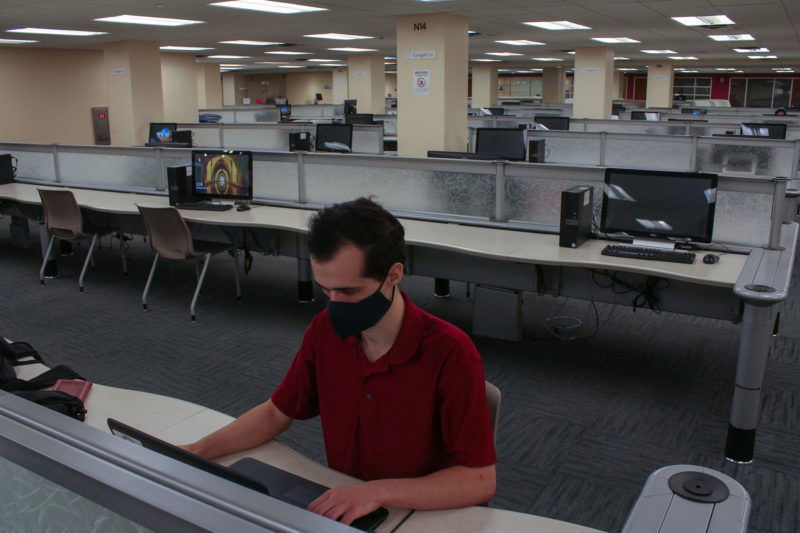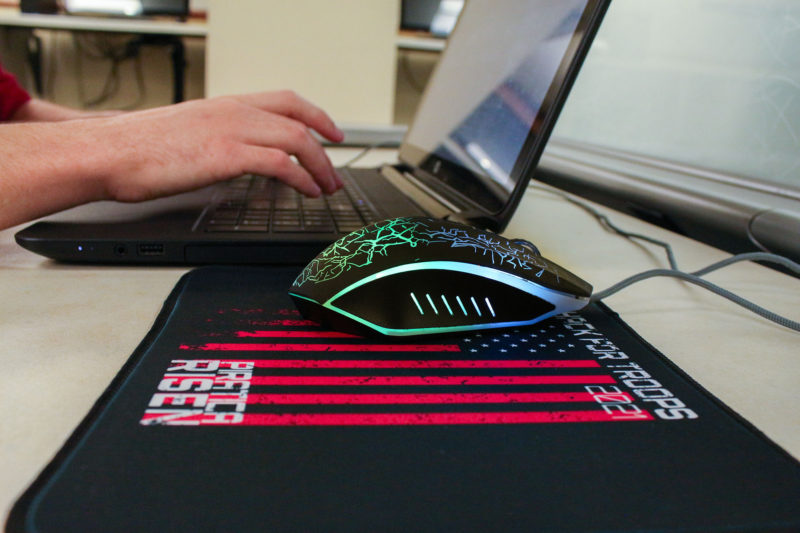Texans Heading to Cyber Games to Tackle Tomorrow’s Digital Challenges
By Andrew Logan
Reporting Texas

U.S. Cyber Games team member Samuel Meyers practices for upcoming cyber games at the University of Houston’s MD Anderson Library on March 5, 2022. The International Cybersecurity Challenge is a competition that is used to identify leading talent in the cybersecurity field. Randall Reyes/Reporting Texas
When San Antonio resident John Johnson was a freshman at the Air Force Academy, he competed in his first cybersecurity competition. He was so green that he couldn’t even figure out how to log on to the computer.
“I literally knew nothing about security,” said Johnson, now an Air Force first lieutenant training to become a code developer. “When I got there, I felt like the dumbest person ever.”

John Johnson will compete in Athens this summer as part of the U.S. Cyber Games inaugural national team. Photo courtesy of John Johnson
But Johnson was enthralled watching other players hack into websites during these competitions. He quickly started picking up those skills.
“Anytime I did any little thing, it was just like this awesome feeling of having accomplished something that seemed almost like magic,” Johnson said. “And I was like, I want to be able to do that, you know. Someday, if I keep at this, I can do that, too.”
Johnson, now 25, and Sam Meyers, a 19-year-old student at the University of Houston studying cybersecurity, have been selected by the U.S. Cyber Games to join its inaugural national team, which will represent the United States in the International Cybersecurity Challenge in Athens, Greece, in June.
Created in April 2021, the U.S. Cyber Games were founded with the mission to generate excitement and identify the next generation of talent in cybersecurity. Vulnerabilities in computer systems have been identified as one of the country’s biggest challenges in the digital age, and experts agree there is a massive need for talented cybersecurity specialists. The U.S. Cyber Games are designed for players to gain real world experience in this emerging field.
“One of the challenges we have in the cybersecurity career field is that it takes over five years for somebody really to have experience in cybersecurity and be valuable to a company,” said Jessica Gulick, commissioner of the U.S. Cyber Games.
“Cyber games help to accelerate that just a couple of years because the athletes that participate or the professionals that participate in cyber games, they get to be immersed into cybersecurity environments and see attacks, practice attacks, practice protection and learn as you go,” she said.
Gulick is also the founder and CEO of Katzcy, a marketing company that helps cybersecurity and IT firms grow. Based in Virginia now, Gulick grew up in Crowley, outside Fort Worth.

Samuel Meyers, who beat more than 680 participants to land a spot on the U.S. team, practices for the cyber games at the University of Houston. One of the goals of the games is to shorten the time it takes for competitors to gain experience in cybersecurity. Randall Reyes/Reporting Texas
Johnson and Meyers competed against over 680 cyber participants from 43 states to win spots on the 25-member team, which consists of a core 15-member travel team, five alternates and five wildcard players for virtual games and practice.
“I never really thought I would see anything like this,” Johnson said. “The fact that it even exists, that we’re going to be, you know, in something called the Cyber Games, like almost this Olympics-type competition with other teams from around the world and like different continents and countries … it’s really cool.”
Meyers said he wants to do his best to represent his country under the pressure of an international spotlight.
“My main goal going into this thing … is just to learn what I can,” Meyers said. “The more you do, the better you get.”
Meyers grew up in a military family and lived all over the country. He always had an affinity for computers, but he became interested in cybersecurity in high school when he joined CyberPatriot, a national youth program created to educate students about cybersecurity.
Meyers likened his love for cybersecurity to his love of chess.
“Both can be seen as problem solving,” he said. “And I think cybersecurity is an incredible outlet to be able to, you know, problem solve in a creative way, figure out how things work, and then figure out how to make the way things work for you.”
The International Cybersecurity Challenge will be a four-day tournament consisting of two competitions known as capture-the-flag, CTF, games.

Competitors in the cybersecurity games will tackle challenges — on offense and defense — to earn points for their team. Randall Reyes/Reporting Texas
During the first competition, called Jeopardy CTF, participants solve custom-made virtual cybersecurity challenges in areas such as cryptography, forensics, web security, reconnaissance or a mix thereof. Players compete simultaneously, but they solve different challenges on their individual computers. Points are awarded for solving challenges. The more complex the problem, the more points it is worth.
“If I were to draw a graph, you know, with the level of emotion with respect to time, as you start a challenge, it would start at the top and then slowly be going down, slowly going down. And then, as soon as you solve it, it would shoot up like, incredibly high. It’s like the best feeling ever,” Meyers said. “There’s nothing like it.”
During the second competition, Attack-Defense CTF, also known as a red team versus blue team challenge, countries have a red team and a blue team. The red team works together as an offensive unit to attack the blue team’s security vulnerabilities. The blue team is to defend itself. Points are acquired by defending against an attack and by successfully implementing an attack.
Meyers is the red-versus-blue captain for the U.S. team.
The games will be held inside the Stavros Niarchos Foundational Centre in Athens. Nine teams of 15 players will be scattered throughout a large room at tables with computers. A video leaderboard will display the score.
In order to qualify, each competitor must be an amateur, a citizen of their country and 14 to 26 years old. The U.S. Cyber Team is only sending players who are 18 and up. Sponsors of the U.S. Cyber Games, such as The National Initiative for Cybersecurity Education and The Cybersecurity and Infrastructure Security Agency, are paying for the travel expenses for the U.S. team.
In addition to an overall winner, awards will be announced for the winner of each game. Winners will not be awarded a cash prize, but they will be able to take home bragging rights.
Joe Sanchez, executive director of the CyberTexas Foundation, said the U.S. Cyber Games and similar initiatives will help inspire young people to get interested in cybersecurity. The CyberTexas Foundation is a San Antonio non-profit trying to develop the next generation of cybersecurity workforce.
“I love the fact that there’s a U.S. Cyber Team,” he said. “People love seeing those brackets of gold, silver and bronze. For a country to be able to say we won the global cyber games, that’s a big feather in the cap.”
As the summer approaches and the International Cybersecurity Challenge grows near, Johnson and Meyers are continuing to train hard for the games.
“I think the people that are most successful are the people who put in the most time,” Meyers said.
“My hope for us is just that we don’t leave anything on the table,” Johnson said. “I don’t think about how we’re going to do against the other teams or anything like that. We just need to do the absolute best we can.”